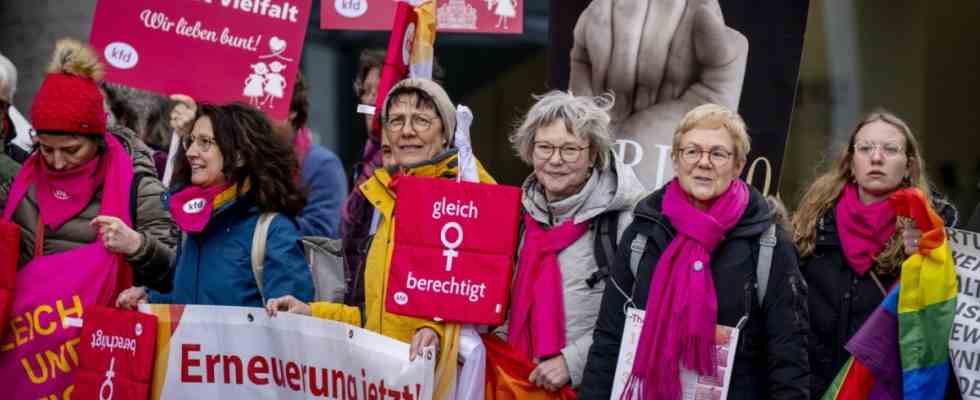The situation would probably be described correctly with “change bath of feelings”: In the end there was cheering, applause and champagne, but also tears and long faces. The Synodal Path, the reform project between Catholic clerics and lay people, clearly spoke out in favor of a diaconate for women on Saturday. The Catholic bishops in Rome should work to ensure that women are admitted to this lowest of the three levels of ordination.
The synodal assembly in Frankfurt am Main approved a corresponding action text on Saturday with 93.6 percent. 80.7 percent of the bishops also voted in favor – “there has rarely been such a clear statement by the bishops in favor of the diaconate of women,” says Bishop Franz-Josef Bode of Osnabrück.
However, this text, like others before it, had been watered down at the request of some bishops. Instead of also addressing the admission of women to all ordained offices, including the priesthood, in the paper, following an amendment by Fulda’s Bishop Michael Gerber, the focus was purely on the diaconate of women – obviously because it was calculated that in Rome this minimal requirement would be met has more chances. This is “a sensitive question,” said Bishop Karl-Heinz Wiesemann of Speyer. Munich’s Archbishop Cardinal Reinhard Marx said it was important “that we walk this path in unanimity”.
“It’s just not enough”
In fact, however, the Synodal Way remains in its votes at the level of the Würzburg Synod, which took place from 1971 to 1975. Rome had already been asked back then to examine the diaconate of women – nothing happened except that John Paul II stated in his letter “Ordinatio Sacerdotalis” in 1994 that only men could become priests.
“It’s just not enough,” said Synodal Gudrun Lux in the emotional debate on the bishop’s amendment. “It supports structural discrimination against women,” said Erfurt theologian Julia Knop. And Katharina Ganz, the Superior General of the Oberzell Franciscan Sisters, had to fight back tears: “I am existentially affected by these questions.” She feels the call to be a priestess, but cannot live it. “My inner wound will only heal when we have full access to the offices.”
In the end, however, everyone was happy that the text had even made it onto the agenda. It was briefly discussed whether he could not be moved to the synodal committee – this is a body that is to start work after the synodal path in order to continue working on the reform issues.
However, another key text was actually referred to this committee, which has yet to be formed. The paper “Consulting and deciding together” should clarify how laypeople and bishops can decide together at diocese level in the future. However, the Vatican only declared these bodies inadmissible in January – which is why they obviously did not want to risk any further conflict.
In any case, many of the bishop’s wishes for weakening were to be understood as a reaction to Roman pressure. The texts have been going back and forth in the four synodal forums for months, but only last week at their spring plenary assembly did several bishops announce their change requests.
“We need patience as an ass”
The balance of the President of the Central Committee of German Catholics (ZdK), Irme Stetter-Karp, is therefore rather sobering: “We have not managed to really change the structure of the Catholic Church in Germany, three and a half years were not enough,” she said . The church still has major reforms ahead of it, but according to Stetter-Karp, the fact that they are now openly on the table is thanks to the synodal path. When it comes to the women’s issue, you need “ass patience” so that you can progress millimeter by millimeter.
But some of the papers could actually change life at the church base: There should be blessing celebrations for loving couples, regardless of whether they are straight or gay or whether they have already been divorced and remarried. In addition, lay people should also be allowed to preach in church services. The basic rules for church service, according to which openly lived homosexuality is no longer a reason for dismissal, have already been passed by the bishops.
The Synodal also approved a paper recognizing gender diversity in the church with 95 percent approval. When baptizing children with an unclear gender identity, it should in future be possible to omit the corresponding entry in the baptismal register or to use the term “diverse” at this point. Transgender Catholics should also be able to have their marital status and first names changed in the baptismal register in an uncomplicated manner.
“We passed the stress test,” said Bishops’ Conference chairman Georg Bätzing. It was a weight lifted from his heart that “despite all the crunching and all the prophecies of doom, we got here”.

